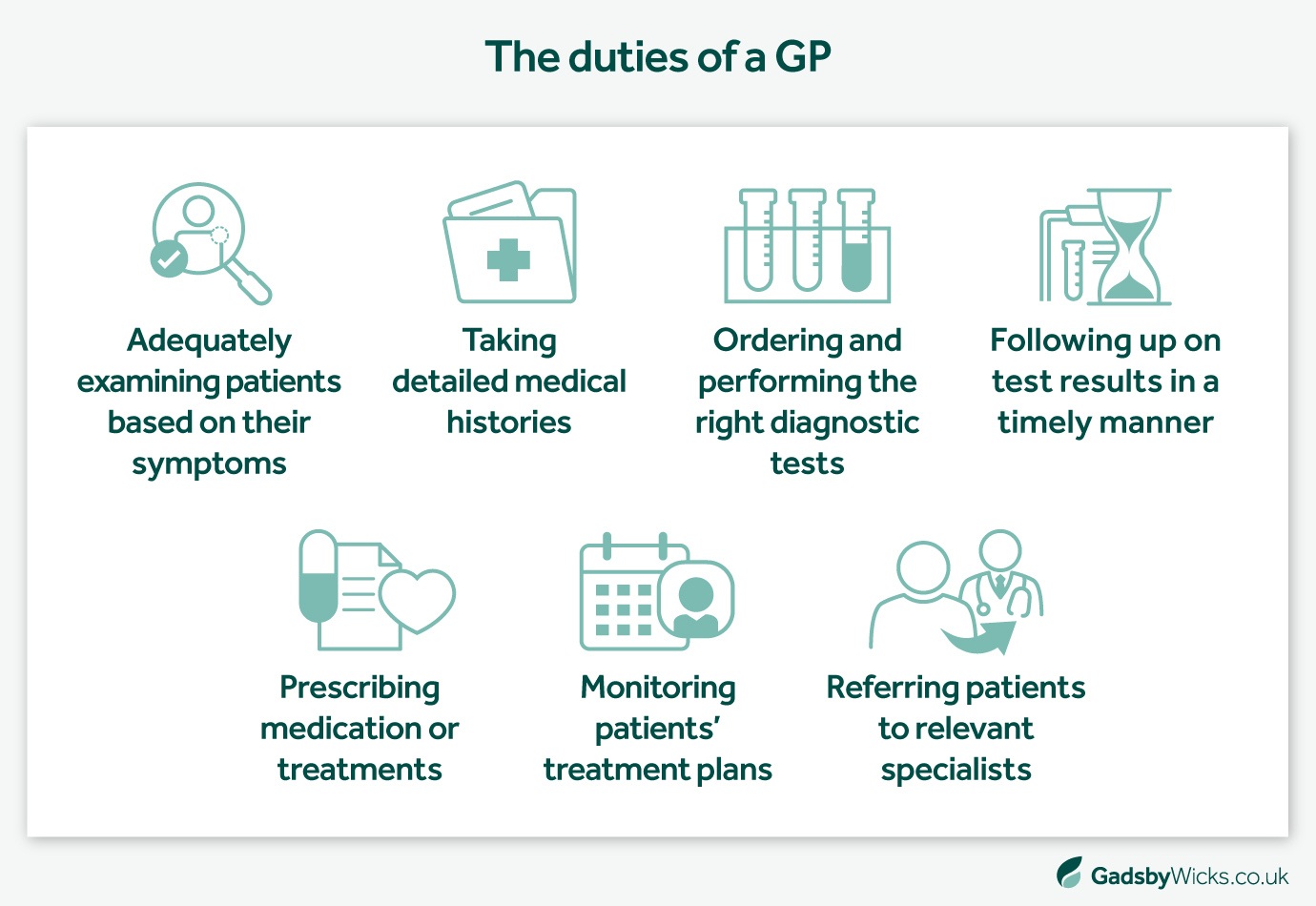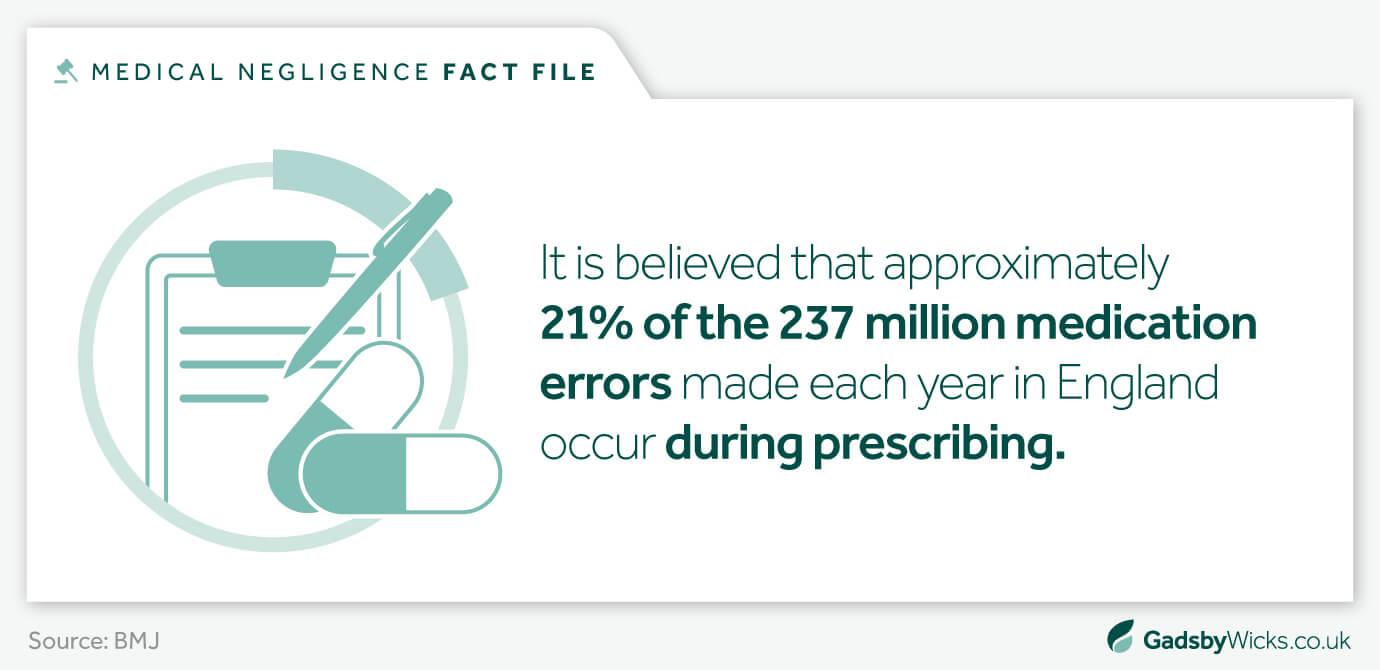- Home >
- GP Negligence Claims
Although the majority of GP visits help people successfully identify and resolve their health problems, when mistakes do happen, we understand the profound impact they can have on your physical and emotional wellbeing.
If you suspect your GP has fallen short of providing adequate care, our skilled solicitors are ready to investigate your claim and prove your case. With over 30 years of experience, we have a proven record of securing the compensation, answers and justice you need to recover from what happened and find closure.

Do you have a GP negligence claim?
As a generalist, we trust our GPs to diagnose conditions, prescribe medicine, make referrals and more. But when they lose results, delay referrals or prescribe the wrong medication, the consequences can be serious and place someone’s health in serious jeopardy.
If your care fell below standards, you may be entitled to make a GP negligence claim. By working with our experienced, compassionate solicitors, we can guide you through every step of your case and obtain a fair settlement that supports you and your family’s long-term future.

The specialist GP negligence claims solicitors for Essex & East Anglia
Since 1993, we've been the go-to solicitors for claimants seeking justice for the negligent treatment they received from their GP.
To secure a fair compensation settlement and enable our clients to move on from what happened, we take the time to understand what happened and thoroughly investigate all available evidence. With 96% of our cases resolved out of court, and ‘no win, no fee’ funding available, we give you total peace of mind at every stage to achieve the result you deserve.
How much could your GP negligence claim be worth?
What does our GP negligence claim process look like?

A free initial consultation
Call us, request a callback or complete our online form and we’ll assess if you have a valid medical negligence claim.

Funding your claim
Discover the ways we can fund your claim without you paying a penny at any stage of the process.

Investigating evidence
We gather medical records, witness statements and more to learn what happened to you and prove your claim.

Instructing independent medical experts
We work with impartial, experienced medical experts to establish whether your injuries were due to substandard medical care.

Valuing your claim
We assess your health and financial losses to accurately estimate how much compensation your claim is worth.

Presenting your case
We contact the Defendants and the Courts on your behalf to set out your allegations and receive a response.

Negotiating a settlement
We work to achieve a fair settlement for you outside the courtroom – this is how 96% of our cases end.

Preparing for Trial
If we must proceed to Trial, we fully prepare you for what to expect so you receive the right result in court.
FAQs about GP negligence compensation claims
What is GP negligence?
When we experience worrying symptoms, for most of us our first port of call is our GP surgery. GPs are highly trained medical professionals, working both in NHS trusts and in private surgeries, and as generalists are expected to fulfil several crucial duties:
- Adequately examining patients based on their symptoms
- Taking detailed medical history notes
- Ordering and performing the right diagnostic tests
- Following up on test results
- Prescribing medication or treatments
- Monitoring patients' treatment plans
- Referring patients to relevant specialists
Every day thousands of people visit their doctors expecting to find out if anything is wrong and, if necessary, offer treatment to cure or manage the problem. Or, when this is not possible, be referred to the appropriate specialist in the appropriate timescale.
The vast majority of the time, our GPs carry out these vital tasks competently, helping to resolve our concerns. However, if the care they provide is substandard, they make mistakes, or they fail to act on signs and symptoms, they may be liable for negligence if this causes harm to their patients.

When might a GP be considered negligent?
GPs owe a reasonable duty of care to their patients, whether they diagnose and treat their condition personally, or refer them to a specialist for further examination, investigation, diagnosis and treatment. There are several circumstances where this duty of care to the patient may be breached:
Misdiagnosing conditions
Many GP negligence claims involve cases where a patient’s condition has been wrongly diagnosed, leading to a significant delay in the patient’s treatment.
The law does not expect GPs to always diagnose accurately. The human body is complex, and sometimes more than one disease or condition will present with the same or similar symptoms. However, they are expected to take reasonable action based on the symptoms described and any physical signs.
For example, if your doctor notes down your persistent cough, but does not consider your sore throat and shortness of breath, this could mean that you overlook potentially serious diagnoses, do not perform certain tests and/or do not refer for further examination.
Failing to adequately examine a patient, investigate symptoms or perform relevant tests can all lead to a misdiagnosis claim. The delay caused by a misdiagnosis can cause symptoms to get worse, cause additional suffering and, sometimes, extensive or invasive treatment.
For some, an inaccurate diagnosis can significantly affect their prognosis and impact their future life choices, particularly if this involves misdiagnosis of cancer, heart problems, brain haemorrhage and diseases such as meningitis.
Failing to act on test results
Similarly, if a GP performs diagnostic tests, but fails to address the results, this could also be considered negligent. This may be failing to notice any problems displayed in test results, not informing you of results that require further action, or not passing along results to the relevant specialists for further examination.
Mistakes made during testing or treatment
If your doctor accidentally makes an error while performing tests or treatments, this can lead to a GP negligence claim, depending on the severity of the injury and the long-term repercussions.
Delaying referral to a specialist
Whether this is due to a misdiagnosis, misreading test results or any other reason, if your GP delays referring you to a specialist, this can be considered negligent.
In England, you should be referred to a specialist within two weeks if a GP suspects that you may have cancer. If this is unreasonably delayed, the additional waiting time could cause your illness to progress, changing your treatment options and prognosis.
Prescription errors
A GP may prescribe the wrong medication to their patient. Often, these errors are resolved quickly, without any harm caused. However, prescription errors can occasionally have significant repercussions, such as:
- Allergic reactions
- Conflicts with other medication a patient is taking
- Harm to a patient’s physical condition
- Substantial side-effects
- Delays in curing the health problem

Poor record-keeping
If a GP, doctor or any medical professional does not keep accurate, up-to-date records, this could lead to symptoms, signs, test results and more being overlooked. If this happens, you may not receive the treatment or further examination you would have if your records had been kept in order.
Furthermore, if your GP fails to keep your medical records up-to-date, this could lead to issues later on if you switch GP surgeries. Without accurate information on your current health and medical history, a new GP may prescribe something or treat you inappropriately.
Not offering safety-netting
Your GP should always give you a considered diagnosis based on your symptoms and physical signs, and inform you of how they anticipate their proposed treatment will resolve your problem. They may think that you have a condition which will resolve on its own and suggest that, if your symptoms persist and your health does not improve, come back to see them later.
This is called ‘safety-netting’, ensuring patients know they should return if things do not improve. If your condition does not improve, and you did not receive this safety-netting from your GP, they could be considered negligent.
Why should I hold GPs and doctors accountable for negligence?
We understand it can feel wrong to claim against a GP or doctor for negligence. Our healthcare professionals do great work every day to look after people’s health and, in the overwhelming majority of cases, these actions were genuine mistakes, with no harm intended to their patients.
However, that does not reduce the long-term physical, emotional and financial consequences you or a loved one may face, or the vital role that compensation can play in helping you adapt to the changes to your lifestyle.
Holding healthcare professionals accountable for negligence through medical negligence claims solicitors not only ensures that you and your family gain the financial security you deserve – but it can also spur action and initiatives that prevent what happened to you from happening to anyone else.
View our National and Essex Medical Negligence Statistics post for more industry insight.

How do I prove that my GP was negligent?
If you believe a GP failed to provide you or your loved one with a reasonable standard of care, we will thoroughly investigate your case to establish whether you received negligent treatment.
For any GP negligence claim to be considered, we need to answer three essential questions:
- Did your GP breach the duty of care that they owed you?
- Did you suffer pain, injury, loss or damage?
- Was your suffering a direct result of your GP’s negligence?
To answer these questions, our specialist medical negligence solicitors will assess all evidence available to us, which may include:
- Medical records
- Claimant statements
- Witness statements
- Complaint correspondence
- Photographs
We also work with impartial, independent GPs, actively working in medicine and with a firm grasp of the legal and medical tests we require. Their expertise will inform us of whether your GP’s actions or inactions fell below reasonable standards, and if this impacted your health, treatment options and prognosis.
In addition, you may believe that your GP’s account of what they told you or how you were treated is inaccurate. In these circumstances, we can obtain an audit of the records your GP took at the time of your appointment, to assess whether they reflect what they claim happened.
How can compensation help following GP negligence?
With over 30 years of experience supporting GP negligence claims in Essex and East Anglia, we understand how devastating the consequences of negligent treatment can be.
It could be that the delay in diagnosing and treating your condition results in several further months of pain and discomfort. A condition that could have been easily resolved with medication now requires surgery, placing you at greater risk and requiring you to take time off work.
At the other end of the scale, negligent treatment by your GP could have significant, long-term repercussions:
- Your health may be permanently affected, such as a loss of mobility or ongoing fatigue
- You may require more substantial, long-lasting treatments, such as chemotherapy and radiotherapy due to a cancer misdiagnosis
- You may now have an unfavourable prognosis, such as a reduced life expectancy or being confined to a wheelchair
However GP negligence affects you, our medical negligence team will take the time to understand how you and your family have been affected by what happened.
This ensures that you receive the compensation you need to put you back in the position you should be in had you received appropriate treatment. Or, where this is not possible, to help you make your future as secure, comfortable and fulfilling as possible.
The compensation you receive following a GP negligence claim can cover a variety of costs, including (but not limited to):
- Loss of income
- Procedures and surgeries
- Ongoing treatments and therapies
- Adaptations to the home or vehicle
- Aids and equipment
- Necessary travel expenses
- Psychological therapies
What is the average settlement for a GP negligence claim?
Due to the range of outcomes that can occur due to GP negligence, there is no such thing as an ‘average’ settlement for these types of claims.
The amount of compensation you are entitled to depend on your unique circumstances – how has your health been affected? How did your treatment options change? How is your life different compared to how it should have been?
We will work closely with you to determine the answers to these questions and speak to relevant experts to ensure we pursue the compensation you deserve.
Contact our expert GP negligence claims solicitors
If you or a loved one has received substandard treatment from your GP, speak to someone about your options. Our team is here to listen and advise you on your next steps.

Lexcel accredited medical negligence claims solicitors
We are proud to be a Lexcel-accredited practice. The accreditation is a mark of quality and comes directly from the Law Society.
A recent assessment described us as a “Centre of Excellence” and we continue to operate to the highest standards across all main areas of our field. These include client care, case management, financial management, structure and strategy, people management, risk management, information management and file management.










